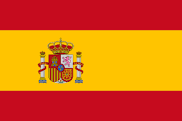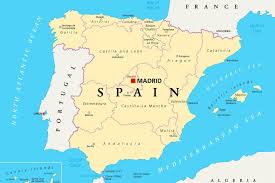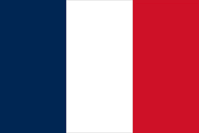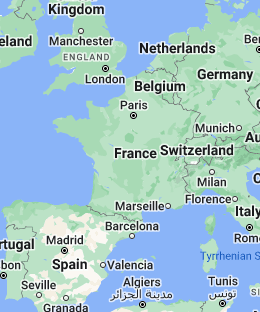
Spanish
I instruct you in the way of wisdom
and lead you along straight paths. Proverbs 4:11
As a Catholic school it is our mission to educate pupils in such a way that no matter what their abilities or background, they may reach their full potential as human beings. We thus seek to overcome any hindrance that might prevent any pupil accessing the fullness of the curriculum, opportunities, and activities we offer.
The language being discretely taught at Key Stage 2 is Spanish. The teaching is delivered by a language specialist from Primary PPA Cover.
The teaching of Language
The teaching of Language at St Thomas More is vibrant and exciting. In Early Years and Key Stage 1 the focus is on many different languages, particularly those spoken by the children. Opportunities are taken to compare words from different languages, and during Registration an observer would be likely to notice the children responding with greetings in a variety of languages.

At St Thomas More, children learn Spanish beginning in Year 3 and continuing through until Year 6. Spanish is an opportunity for children to discover a new language and to develop a curiosity for languages, as well as broadening children’s awareness of different cultures around the world. They are taught through a range of written, listening and oral activities, which aim to engage and inspire children. The Curriculum covers language acquisition through grammar, songs, stories and the sharing of conversation. Children also learn to express themselves and how to communicate in a different language.
Spanish Curriculum for this year:
|
Year |
Topics |
|
3 |
|
|
4 |
|
|
5 |
|
|
6 |
|
Year 3
Children start to learn Spanish in Year 3. The topics covered in Year 3 are:
- An understanding of why we learn languages
- Numbers from 1-10
- Greetings and basic questions
- Responding to and saying classroom instructions
- Colours
- Songs and rhymes
- Family members
Through these topics, children begin to build a basic knowledge of vocabulary. Children learn how to pronounce sounds and words, as well as recognising words in reading and spelling vocabulary. Children therefore start to develop their Spanish speaking, listening, reading and writing skills. Additionally, children begin to learn basic Spanish grammar, which will enable them to start to write simple words and sentences independently.
Year 4
In Year 4, children will cover the topics of:
- Fruits & Vegetables
- Expressing opinions & preferences
- Reading a menu
- Describing meal times
- Christmas food & drink
- Numbers to 20
During lessons, children develop their speaking, listening, reading and writing skills, as well as their knowledge of basic Spanish grammar. They also learn the pronunciation of different sounds and words.
Year 5
Children in Year 5 revisit topics covered in Year 3 and Year 4 to ensure that children have a good knowledge of vocabulary. They also learn topics:
- Homes including the rooms
- Numbers up to 50
- Chores
- Daily routines
- Animals
- Masculine and feminine nouns
Through these topics, children continue to develop key skills in speaking, listening, reading and writing. They also learn more complex grammar, including the simple future tense and an increasing range of conjunctions and prepositions.
Year 6
In Year 6, children learn:
- Using a dictionary
- Reading song words
- Decoding unfamiliar texts
- Formal use of ‘you’
- More complex questions
- Further opinions & preferences
- Countries & nationalities
- Holidays
- Weather
Many topics covered in the previous years are also touched again to ensure that they have a good understanding as possible and that children are able to transfer skills across the different topics. They also continue to develop their speaking, listening, reading and writing skills, with their ability to communicate becoming more complex.

MFL (French)
I instruct you in the way of wisdom
and lead you along straight paths. Proverbs 4:11
As a Catholic school it is our mission to educate pupils in such a way that no matter what their abilities or background, they may reach their full potential as human beings. We thus seek to overcome any hindrance that might prevent any pupil accessing the fullness of the curriculum, opportunities, and activities we offer.
From September 2023, the language being discretely taught at Key Stage 2 is French.
The teaching of Language
The teaching of Language at St Thomas More is vibrant and exciting. In Early Years and Key Stage 1 the focus is on many different languages, particularly those spoken by the children. Opportunities are taken to compare words from different languages, and during Registration an observer would be likely to notice the children responding with greetings in a variety of languages.


At St Thomas More, children learn French beginning in Year 3 and continuing through until Year 6. French is an opportunity for children to discover a new language and to develop a curiosity for languages, as well as broadening children’s awareness of different cultures around the world. They are taught through a range of written, listening and oral activities, which aim to engage and inspire children. The Curriculum covers language acquisition through grammar, songs, stories and the sharing of conversation. Children also learn to express themselves and how to communicate in a different language.
French Curriculum for this year:
*This year, all year groups will be taught the Year 3 curriculum, then progress through the curriculum as the children move up through the school.*
Year 3
Children start to learn French in Year 3. The topics covered in Year 3 are:
|
Unit 1: Greetings |
Unit 2: Adjectives of colour, size and shape |
Unit 3: Playground games, numbers and age |
Unit 4: In a French classroom |
Unit 5: A circle of life |
Through these topics, children begin to build a basic knowledge of vocabulary. Children learn how to pronounce sounds and words, as well as recognising words in reading and spelling vocabulary. Children therefore start to develop their French speaking, listening, reading and writing skills. Additionally, children begin to learn basic French grammar, which will enable them to start to write simple words and sentences independently.
From 2024 Year 4
|
Unit 1: Describing (portraits) |
Unit 2: Clothes (getting dressed) |
Unit 3: Numbers, calendars and birthdays |
Unit 4: Food |
During lessons, children develop their speaking, listening, reading and writing skills, as well as their knowledge of basic French grammar. They also learn the pronunciation of different sounds and words.
From 2025 Year 5
Children in Year 5 revisit topics covered in Year 3 and Year 4 to ensure that children have a good knowledge of vocabulary. They also learn topics:
|
Unit 1:Describing (monster pets) |
Unit 2:Shopping |
Unit 3: Verbs |
Unit 4: Family |
Through these topics, children continue to develop key skills in speaking, listening, reading and writing. They also learn more complex grammar, including the simple future tense and an increasing range of conjunctions and prepositions.
From 2026 Year 6
In Year 6, children learn:
|
Unit 1: Sports and the Olympics |
Unit 2: In my house |
Unit 3: Holidays |
Unit 4: Towns |
Many topics covered in the previous years are also touched again to ensure that they have a good understanding as possible and that children are able to transfer skills across the different topics. They also continue to develop their speaking, listening, reading and writing skills, with their ability to communicate becoming more complex.

